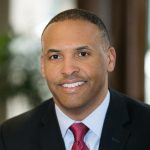Longitude Sound Bytes
Ep 52: Build credibility-Gain visibility | Brian Michael Cooper – by Karen Martinez Perez (Listen)
I am Karen Martinez Perez, Longitude fellow from Rice University, and today I will be presenting a sound byte by Brian Michael Cooper. He is the former president of the XFL Houston Roughnecks and NBA G-League RGV Vipers, and current partner at Frost Brown Todd LLC. As a result of his career journey, he will be speaking to us about managing pressure and how pursuing personal interests can help.

Brian Michael Cooper, Partner at Frost Brown Todd LLC:
I played sports in high school and for a couple years in college. I played football at Cornell. I’ll place the word “played” in air quotes, because I wasn’t very good. But I had a lot of heart and stuck with it even after I suffered a shoulder injury my freshman and sophomore years. After the second injury, my position coach sat me down and pulled off the band aid with a blunt and painfully true statement. “You’re never going to start at the varsity level so you really should stop playing, so it’s not to hurt yourself any further.”
There would be no Rudy moment for me. So I stopped playing. And I thought that was the end of any involvement in sports. At the time, in the early 90’s, most pro executives had generally been former pro players or pro coaches. So as a government major, I anticipated a career in government politics, for which I had equal passion, and I’d completed two internships on Capitol Hill.
So government was the career I anticipated, when I was admitted to a joint degree program between Harvard’s Kennedy School of Government and Columbia Law School. In my first year at Harvard, I was working on a year-end project for my antitrust class. I liked antitrust because it was a nice mix between government and the law. When I was stumped on a subject for the project, my advisor asked, “What industries are you passionate about?” I replied sports. And he said, “Well, why don’t you write about an antitrust issue involving the sports industry?” And I did. I wrote about the NCAA’s application of Proposition 48, a rule designed to raise graduation rates by having athletes at NCAA Division One schools meet certain minimum academic standards. My analysis examined whether the administration of the rule could be considered anti-competitive. This project was important to me because it ignited my thinking that there were other businesses, government and legal interest, related to the sports industry that may serve as the platform for a career.
My second year at Harvard, I completed my final initiative, known as a Policy Analysis Exercise or PAE. I decided that I wanted to do my PAE on Midnight Basketball. In the early 90’s, Midnight Basketball was touted as a transformative social program that served as a safe haven for teens. Young people could play in these basketball leagues, and the leagues also had an educational component. It was a great example of how sports can transform communities. The sponsor for my PAE was the NBA. And at that point, I began to switch my career focus from government to sports. When I began my second year at Columbia Law, I was able to be paired with a Columbia alumni mentor who was a New York sports lawyer. And at that point, I started focusing on what I wanted to do next. I was fortunate enough to get a clerkship and then ultimately a full time job at Proskauer, a law firm that has a significant history in sports. And that’s how I started my career, working as a sports lawyer and sports executive.
[To see more of Brian’s views, explore our Career Conversations feature Sports and law: An intersection for a fulfilling career.]

Karen Martinez Perez, Longitude fellow, Rice University:
I find Brian’s words to be inspiring and motivating. I’m a first-generation college student trying to figure out what I want to do post-grad. What I have come to realize, and what Brian also discovered, is that there isn’t only one way to do something. While he may not have gone the “traditional” route to end up doing something in sports, he found something that worked for him. The ideal job involves something that you’re passionate about. This way, perhaps it can be easier to find motivation in day-to-day life. One of the main takeaways from Brian’s story for me is that in a career, you don’t have to sacrifice your personal interests. I think it’s great that even though there was a period of time where Brian wasn’t as directly involved with sports as before, he didn’t just throw away his interest. Rather, he set it to the side temporarily, and eventually, discovered a way to incorporate it into his life again. I also admire Brian’s willingness to take on projects that further explored his interests, despite leading away from the career in government politics he anticipated. In doing so, he found a way to make the pressure from the demands of a career be a bit more manageable and enjoyable.
We hope you enjoyed todays segment. Please feel free to share your thoughts over social media and in the comments, or write to us at podcast@longitude.site. We would love to hear from you.
Join us next time for more unique insights on Longitude Sound Bytes.
